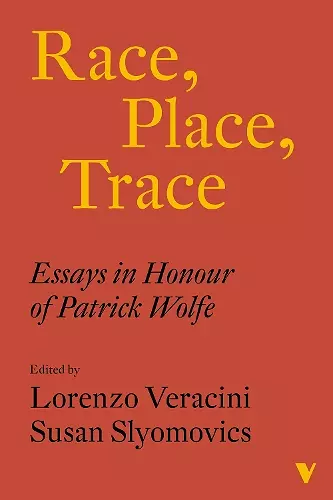Race, Place, Trace
Essays in Honour of Patrick Wolfe
Susan Slyomovics editor Lorenzo Veracini editor
Format:Paperback
Publisher:Verso Books
Published:1st Feb '22
Should be back in stock very soon

Continuing Patrick Wolfe's work on settler colonialism
This edited collection celebrates Patrick Wolfe's contribution to the study and critique of settler colonialism as a distinct mode of domination. The chapters collected here focus on the settler-colonial assimilation of land and people, and on what Wolfe insightfully defined as 'preaccumulation': the ability of settlers to mobilise technologies and resources unavailable to resisting Indigenous communities. Wolfe's militant and interdisciplinary scholarship is thus emphasised, together with his determination to acknowledge Indigenous perspectives and the efficacy of Indigenous resistances. In case studies of Australia, French Algeria, and the United States, contributors illustrate how seminal his contribution was and is. There are three core reasons why it is especially important to develop the field of thinking inaugurated by Wolfe: first, because the demand for Indigenous sovereignty has been crucial to recent struggles against neoliberal attacks in the settler societies; second, because a critique of settler colonialism and its logic of elimination has supported important struggles against environmental devastation; and third, because the ability to think race in ways that are not disconnected from other struggles is now more needed than ever. Racial capitalism and settler colonialism are as imbricated now as they always have been, and keeping both in mind at the same time highlights the need to establish and nurture solidarities that reach across established divides.
Praise for Settler Colonialism: A Theoretical Overview:
The definitive theoretical and historical introduction to settler colonialism. * Oxford Bibliographies *
Praise for Settler Colonialism: A Theoretical Overview
Crisply theorized. -- Zoë Laidlaw * The Historical Journal *
Praise for How to Accept German Reparations:
An idiosyncratic, far-ranging, well written book. This is several thoughtful books in one. -- Lora Wildenthal * German History *
Praise for How to Accept German Reparations:
This remarkable book is a deeply anthropological study of a problem that reaches back into the author's own familial past and connects it with an astonishing but entirely persuasive array of themes, including agency, victimhood, nationalism, racism, and religion. Slyomovics's measured, graceful prose undoes the false simplicities of attributing right and wrong-locating the book securely at the heart of what social anthropology is all about. -- Michael Herzfeld, Harvard University
Praise for The Performance of Human Rights in Morocco:
An important contribution to scholarship on an area of the world that receives relatively little attention as well as an important contribution to what is fast becoming a fifth subfield for anthropology: legal anthropology. * Journal of Folklore Research *
Patrick Wolfe reached into the dark heart of settler colonialism and provided us with a world changing theory, grammar, and politics with which to respond to the ongoing subjugation of colonised peoples. These essays enact the profound legacies of a singular intellectual-activist and demonstrate the enduring power of his analysis -- Melinda Hinkson, Director, Institute of Postcolonial Studies and Associate Professor of Anthropology, Deakin University
Setter colonial studies is impossible to imagine without the concepts that Patrick Wolfe developed over decades of thinking about Indigenous dispossession and racialization. Because colonialism is not 'post' in settler societies, the task of theorizing their modalities of domination and erasure remains a pressing task. Race, Place, Trace is a fitting tribute to, and continuation of, his singular legacy. -- A. Dirk Moses, author of The Problems of Genocide
Patrick Wolfe would have loved this book. I could imagine him wanting to participate in the arguments that are offered throughout its pages, for all the chapters are infused with the same scholarly rigour and critical passion that characterised his own work. -- Ghassan Hage, Anthropology, University of Melbourne
ISBN: 9781839766169
Dimensions: 210mm x 140mm x 13mm
Weight: 179g
192 pages